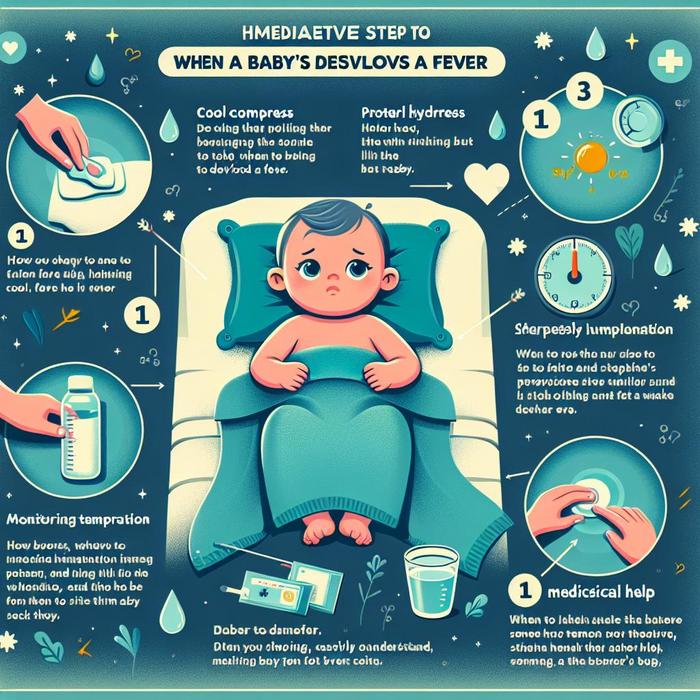Quick Actions to Ensure Your Baby’s Safety During a Fever
Fevers in newborns and infants can be alarming for new parents. However, armed with the right knowledge and appropriate game plan, you can handle this common baby health issue effectively. Within this gathered information, we will guide you through the preliminary steps of baby fever care to ensure immediate baby care when your little one is sick.
Understand What a Fever Is
Before you tackle the issue, it is important to understand what a fever is. A fever is your baby’s body’s natural response to fighting infections. A higher body temperature makes it more difficult for the bugs causing the infection to survive. In infants and babies, a rectal or ear thermometer reading of 100.4°F (38°C) or higher indicates a fever. This information corroborates with leading health organizations like Seattle Children’s Hospital and WebMD.
Preliminary Steps for Baby Fever Care
As soon as you realize your infant has a fever, follow these steps to manage their condition:
- Don’t Panic: Staying calm will help you make rational decisions for your baby’s immediate care. Remember, a fever is a sign that the body is fighting an infection.
- Check Temperature Regularly: Regular monitoring of your baby’s temperature can help you track the behavior of the fever.
- Keep Your Baby Comfortable: Dress your baby lightly, and ensure the room temperature is comfortable.
- Maintain Hydration: Encourage breastfeeding or bottle-feeding to avoid dehydration.
- Monitor Your Baby’s Behavior: Any changes in your baby’s behavior, such as trouble sleeping or lack of appetite, should be monitored closely.
When To Seek Medical Attention?
Knowing when to seek medical attention can ensure your baby’s safety. According to MedlinePlus, it’s crucial to contact a healthcare provider immediately if your baby is younger than 3 months and has a fever. For babies aged 3-6 months, seek immediate medical attention if there are accompanying symptoms with the fever or if the fever exceeds 102°F. This advice also aligns with guidelines from KidsHealth.
Protocols to Follow While Waiting for Medical Assistance
While you are waiting for medical guidance, here’s what you can do to ensure your baby’s comfort and safety:
- Keep Cool: A lukewarm bath can help lower your baby’s body temperature. Remember, the water should feel warm, not hot.
- Stay Close: Physical comfort matters a lot. Hold your baby in your arms, provide skin-to-skin comfort, and try soothing techniques that have worked in the past. You can also refer to our guide on decoding your baby’s cries for additional help.
- Monitor Frequently: Keep checking your baby’s temperature and look out for any significant changes.
Remember, every baby is different, and the way they react to being sick can also vary. It’s crucial to learn to understand your baby’s unique signs and respond accordingly. Always trust your instincts, and when in doubt, reach out to healthcare professionals for guidance. Together, we can ensure that your baby is comfortable, safe, and well-cared for even during difficult times like these.
Can Fever Be Prevented?
While it’s nearly impossible to prevent your baby from ever catching an infection, there are some precautionary measures you can adopt to minimize the risk:
- Immunizations: Ensure your baby gets the necessary vaccinations so as to mitigate the risk of preventable infections. Check the schedule of typical immunizations for newborns and infants provided by NHS UK.
- Maintain Good Hygiene: Regular hand-washing, keeping surfaces clean, and avoiding contact with sick individuals can help minimize exposure to harmful bacteria and viruses.
- Healthy diet and breastfeed: Feeding your baby a balanced diet full of fruits, vegetables, and proteins can boost their immune system, making them less susceptible to infections. Moreover, for newborns and babies up to six months, breastfeeding is the best source of nutrition and confers immunity benefits. Advice from Healthline supports this point.
Effective Home Treatments for Baby Fever
In most cases, you can manage your baby’s fever at home with the following methods. Always remember to consult your healthcare provider before starting any new treatment:
- Medication: Over-the-counter medications such as acetaminophen (Tylenol) or ibuprofen (Advil, Motrin) can help lower the fever and soothe your baby. But, always check with a healthcare professional for correct dosages based on your baby’s age and weight.
- Fluids: Fever can cause dehydration, hence it’s crucial that your baby stays hydrated. For babies under six months, breast milk or formula should suffice. For older babies and toddlers, you can add in small sips of water or oral rehydration solutions.
- Comfort: Ensuring your baby is comfortable and well-rested is one of the best fever treatments. Keeping them in lightweight clothing in a cool, but not cold, room can help the body regulate temperature.
Continuous Monitoring During Baby Fever
While your baby is fighting off the fever, it’s crucial to closely monitor their behaviour and symptoms. Mark any changes in your baby’s appetite, sleep, playfulness, or comfort level. While these changes may be related to the illness causing the fever, you should note these as potential warning signs if they persist.
For more detailed monitoring, you can benefit from the tips provided by Nationwide Children’s Hospital and their resources on baby fever.
Understanding Recurrent Fevers in Babies
If your baby is experiencing recurrent fevers, it could be due to different infections or one persistent infection. This could be a sign of a compromised immunity or other underlying health conditions. In such situations, always consult with a healthcare professional to get guidance or required medical intervention.
Remember, every episode of fever is different. Knowledge is power – the more you know, the better equipped you’ll be to act. Be vigilant, observe your child’s unique signals and respond accordingly. Always trust your instincts and seek medical help when necessary. Together, we can ensure your baby’s comfort and safety.
For a more comprehensive understanding of fever in newborns, you can refer to the guidelines provided by Nationwide Children’s Hospital.

